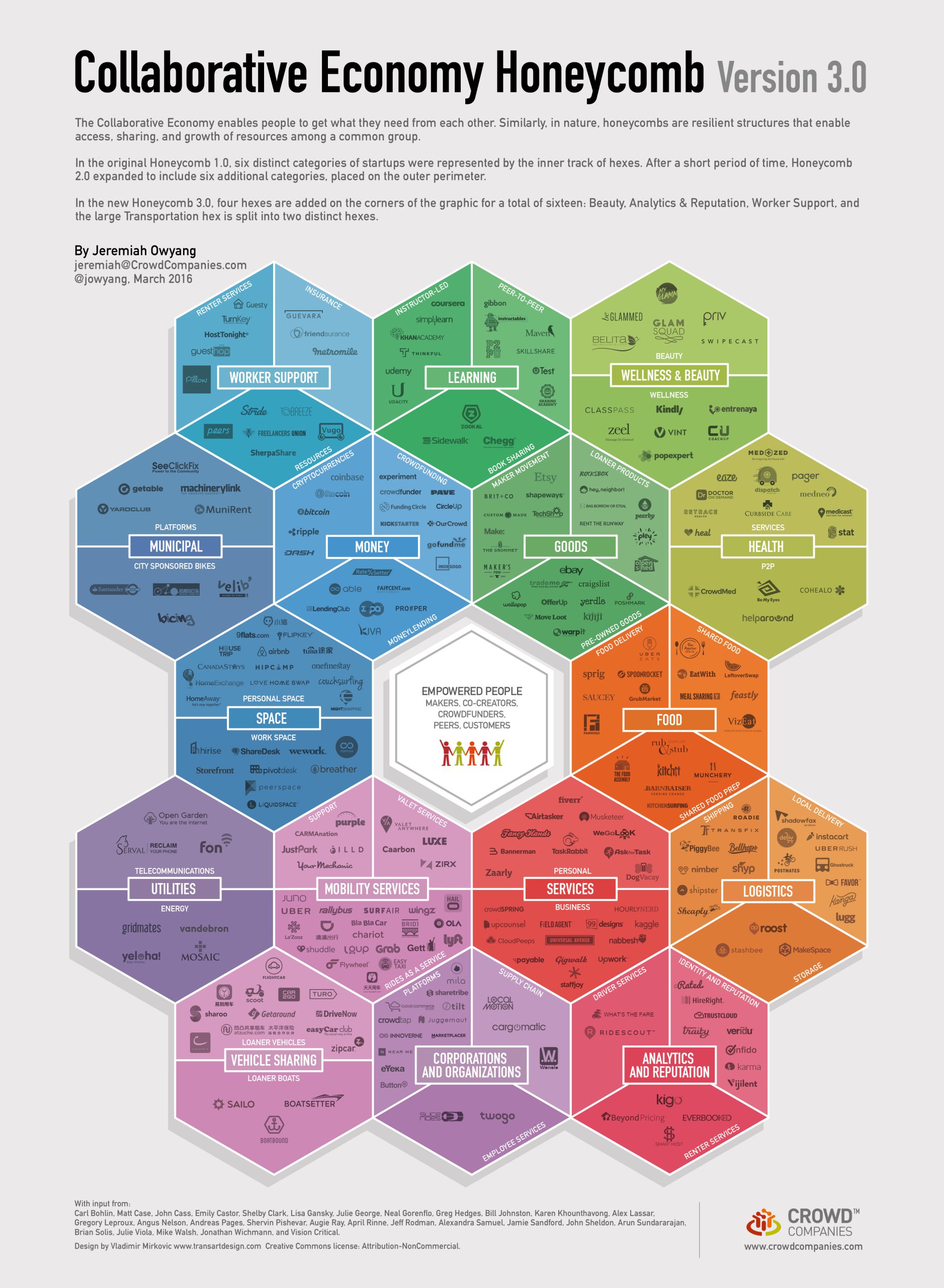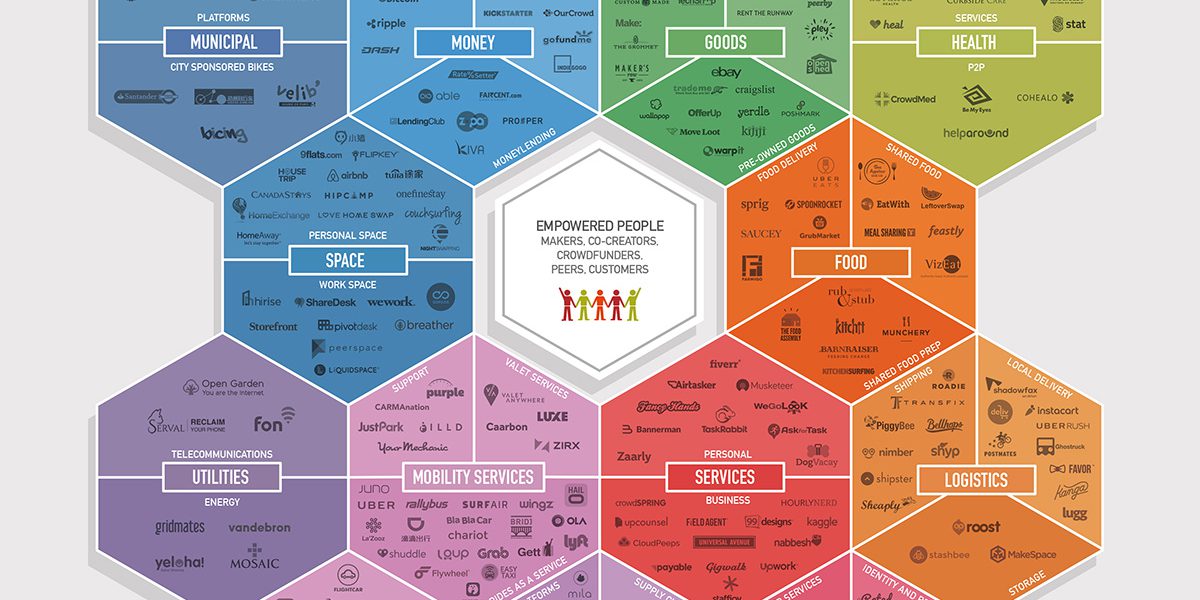The collaborative economy has achieved a global scale in a very short time for the reasons mentioned in the previous article. The benefits generated by companies in the cooperation economy are also worth emphasizing. In a study on the economy of cooperation conducted in Poland in 2016 (sample n = 1,517 people reflecting the population of Polish internet users in terms of: age, place of confusion and gender), the respondents indicated the following benefits (multiple choice):
saving money – 79%
better use of things – 69%
opportunity to earn extra money – 68%
opportunity to try new things – 66%
willingness to help others – 62%
feeling of being a conscious consumer – 61%
more possibilities – 61%
is good for the environment – 60%
feeling of being a valuable member of the community – 54%
meeting new people – 53%
feeling of being part of a larger movement – 46%
In a survey conducted by the Havas agency in 2014 in 29 countries (including 502 people from Poland), a list of benefits in relation to the economy of cooperation indicated by consumers was distinguished (the possibility of selecting only one answer):
saving money – 32%,
feeling of being active and useful – 13%,
reduction of CO2 emissions – 13%,
participation in the wider objection to overconsumption movement – 10%,
supporting individuals and / or small independent companies – 9%,
experiencing something interesting / doing something most people have not tried yet – 8%,
the opportunity to meet new people – 6%.
From the point of view of individual individuals, the benefits can be divided into economic, social and environmental. However, it is worth adding that thanks to more efficient consumption and better use of current resources, people using the collaborative economy contribute to the sustainable development of the whole world – lower energy consumption translates directly into environmental protection.
The collaborative economy is controversial in some areas, and is even the subject of protests in the taxi industry. Undoubtedly, lower costs of providing services and access to goods mean that representatives of old companies (e.g. taxi corporations) perceive a threat to their existence. The question of the impact of the collaborative economy on the traditional economy has not yet been explored in detail. In the following articles, I will analyze the impact of the economy of cooperation on the current solutions. Taxi corporations accuse companies such as Uber, Wunder, Heetch, Lyft, Gett and many others of taking unfair prices from them by offering highly competitive fares. It seems that there is now a need to investigate this phenomenon, to what extent it is not fair competition, and to what extent it is not an innovation that uses the available resources, so far not used in the economy, more efficiently.
The innovations introduced by the collaborative economy concern most branches of the economy. Of course, there are some differences in the degree of development of individual areas, but this does not change the fact that the cooperation economy is present in almost every area of economic life. J. Owyang presented the most comprehensive division of the economics of cooperation in his honeycomb prepared by Crowd Companies. It distinguishes the following areas of cooperation economics: education, finance, goods, food, real estate, transport, services, media, logistics, corporations, health, and municipal services. Within each area, there is an even more detailed division into the nature of the service, eg B2B, B2C, P2P.

The above-mentioned honeycomb presents the most comprehensive approach to the collaborative economy model on a global scale. During its creation, the database of over 9,000 collaborative economy companies from around the world was used.
Here is a list of the areas that are currently available in Poland:
TRANSPORT – car sharing in cities (e.g. Uber, Wunder),
TRANSPORT – sharing city bikes (e.g. Next Bike, Veturillo),
TRANSPORT – shared trips by private car between cities – (e.g. BlaBlaCar, jadezabiore.pl),
ACCOMMODATION – sharing a private apartment or room for short-term rental – (e.g. Airbnb, Couchsurfing),
EDUCATION – online courses and training (e.g. Khan Academy, Coursera, Udemy),
SERVICES – provision of services by private persons – not bulletin boards, not specialist evaluation portals (e.g. TakeTask.pl, Freelancer.com),
REAL ESTATE – co-working offices – coworking (e.g. Business Link, mymeetingrooms),
FINANCE – project co-financing and loans from private persons (e.g. Kickstarter, PolakPotrafi.pl, Kokos.pl),
FOOD – selling food products directly from farmers (e.g. RanoZebrano.pl, LokalnyRolnik.p, food cooperatives),
ENTERTAINMENT – streaming video and music (e.g. Spotify, WIMP, Deezer, Netflix),
MEDIA – social media (e.g. Facebook, Youtube, Instagram),
GOOD – selling and exchanging items (eg Gumtree, Allegro, Olx).
Cheers,
LSZ

